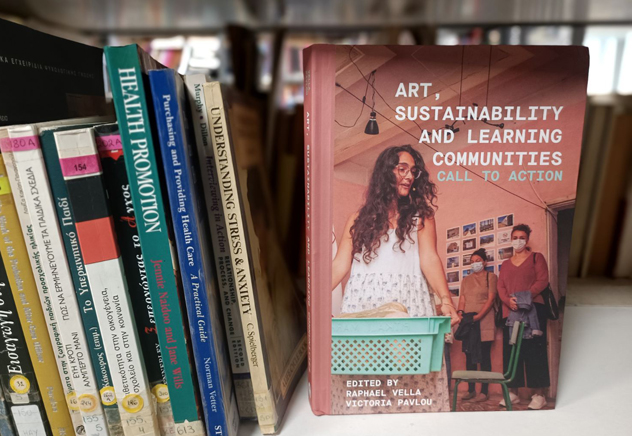
Book by Prof. Victoria Pavlou on Sustainability, Art Education and Learning Communities

Professor Victoria Pavlou, an active member of our University community in the fields of Art and Sustainability, is the co-editor of a new book titled "Art, Sustainability and Learning Communities: Call to Action". The book was published on February 24th, 2024.
The book is co-edited with Professor Raphael Vella, a member of the Department of Arts Faculty at the University of Malta.
By engaging with education, contemporary art and global sustainability goals, the book connects the artistic way of communication with ecological obligations and social issues and promotes a sense of active citizenship. Through international, empirical, and curricular research, it advocates for robust learning communities that endorse socially engaged art teaching methods. The main aim of the book is to show how shared spaces for exchange in the fields of art education and continuous professional development can reflect, inspire and integrate sustainability principles that are becoming crucial in today’s world.
Academics, researchers, and artists from Cyprus, Greece, Malta, the USA, Great Britain, Germany, Finland, Chile, Turkey, Ghana, Australia, Cambodia, and Canada have contributed to the 21 chapters of the book. These chapters are organized into three parts, with two of them based on the University's CARE project.
The authors propose the idea that coordinated action can lead to a more sustainable future by promoting a sense of community, lifelong learning and confidence in the possibility of changing current conditions. The three parts combine expertise in visual arts education, education for sustainable development, contemporary art practice and sustainability activism. While Part I focuses on literature in the field and the interrelation of different disciplines, Part II provides concrete examples of professional learning communities and pedagogies that can be used to enrich the field of art education. Part III presents brief case studies illustrating international projects by contemporary artists, curators, environmentalists and others, providing educators with several inspirational models of concrete and creative action.
In this Intellect Books publication, Prof. Pavlou focuses on three main subjects:
- Learning Communities and Creative Actions for a More Sustainable Planet, co-authored by Prof. Pavlou and Prof. Vella
- Envisioning Better Futures: Integrating Sustainability Practices Into Museum Education for Elementary Student Teachers, co-authored by Prof. Pavlou, Dr Chrysanthi Kadji-Beltran, and
- Promises and Delivery: Teacher Education for ESD-Enhanced Visual Arts Education, co-authored by Dr Chrysanthi Kadji-Beltran and Prof. Pavlou
You can read more on the book here.
An avid believer in the power of art education, Prof. Pavlou also wrote an article on a similar subject, in collaboration with Dr. Aurelio Castro-Varela, an Assistant Professor of Cultural Pedagogies at the University of Barcelona. The two worked together on the European-funded project CARE/ss: Critical Arts Education for Sustainable Societies. Their article, titled "E-Learning Canvases: Navigating the Confluence of Online Arts Education and Sustainable Pedagogies in Teacher Education" is published on Sustainability Journal's special issue Towards Sustainable Development Goals: Integrating Technologies into Education in the Digital Era.
Recent education policy debates in Europe focus on adapting European education systems to modern societal needs, emphasizing competency-based education to cultivate personal fulfillment, employability, active citizenship, social cohesion, and lifelong learning. Notably, digital and sustainability competencies are regarded as pivotal for building sustainable societies. Within this context, arts education assumes significance because of its experiential nature, engaging learners not only intellectually but also emotionally and ethically. The article explores how teacher educators can provide quality arts education that embraces sustainable pedagogies through digital technologies. It delves into teacher educators’ perspectives on the challenges and opportunities presented by digital technologies when teaching arts courses online. Conducted as part of the European-funded project CARE/ss, the study involved interviews with 25 academics from five European countries. Key challenges identified include converting course content for online delivery, ensuring access to high-quality resources, or maintaining students’ active involvement in the online learning process. Conversely, educators adapted arts education by revising teaching methods through digital technologies and developing new materials to promote inclusivity, engagement, participation, and action. Implications offer guidance to arts educators on how to reconfigure their role when delivering arts courses online.
You can read the full article here.

